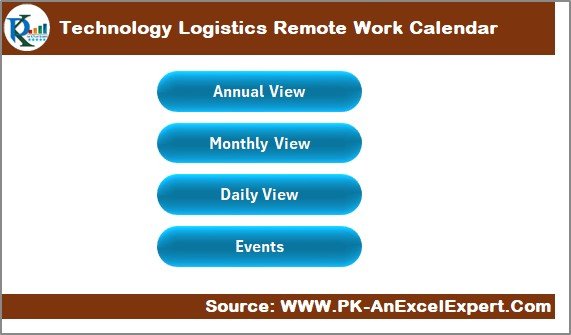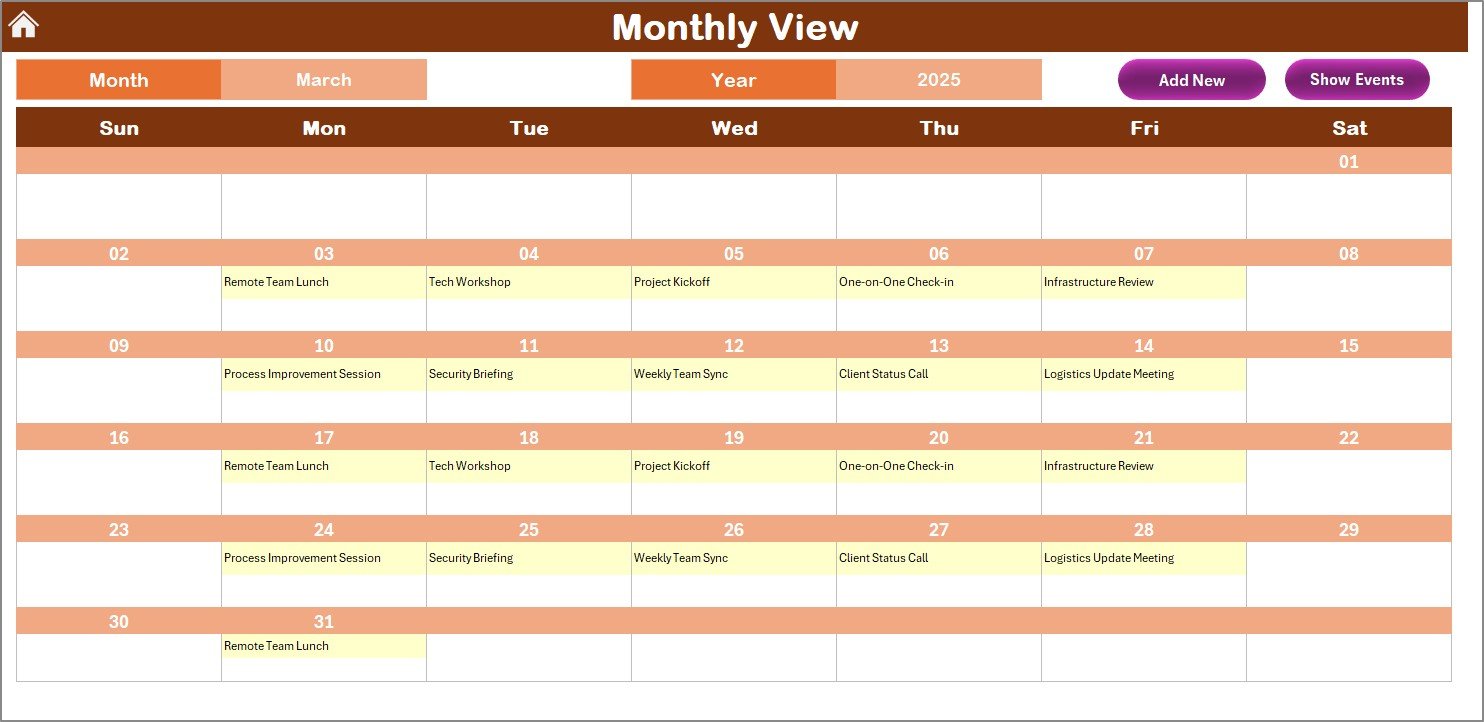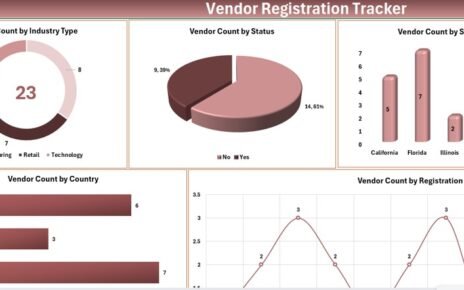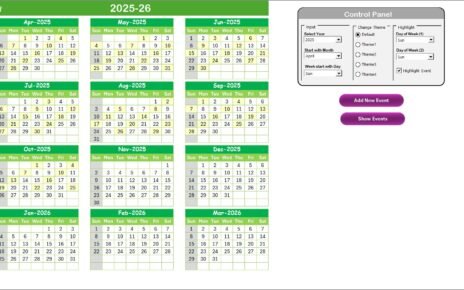A Technology Logistics Remote Work Calendar in Excel stands as a ready-to-use scheduling system crafted specifically for tech and logistics teams working remotely. Rather than juggling multiple apps or paper planners, you manage every event, shift, and deadline right within one Excel workbook. Thanks to built-in controls, color themes, and event-management forms, the calendar adapts instantly to your company’s needs.
Moreover, this template leverages Excel’s flexibility—so you can tweak formulas, adjust layouts, or integrate it with other dashboards. In short, you enjoy both simplicity for end users and depth for power users wanting to extend its capabilities.
Click to Purchases Technology Logistics Remote Work Calendar in Excel
Who Can Benefit from This Calendar?
-
Logistics Coordinators scheduling pickups, deliveries, and loading docks.
-
IT Managers planning maintenance windows or remote deployments.
-
Project Leads assigning tasks across distributed teams.
-
HR Teams tracking remote staff leave, training sessions, or company events.
-
Small Businesses needing one consolidated calendar for all remote operations.
Because the workbook remains in Excel, you avoid learning curve delays. Plus, you can securely share a single file via your organization’s cloud drive or intranet.
Key Features by Worksheet
This template contains five core worksheets. Each one focuses on a distinct view or function:
Home Sheet Tab

On opening the workbook, you land on the Home sheet. Here, you find:
Index Buttons
- Annual View: Jump to the full-year overview.
- Monthly View: Switch to a single-month calendar.
- Daily View: See a detailed list of events.
- Events: Open the database of all event records.
This dashboard-style sheet boosts usability. For example, if a team member asks, “When is the next system maintenance?”, you click Annual View and instantly spot it.
Click to Purchases Technology Logistics Remote Work Calendar in Excel
Annual View Sheet Tab

The Annual View sheet lays out all 12 months side by side. In addition, you find:
-
Control Panel with three groups:
Input Group
- Year Selector: Change the calendar year.
- Starting Month: Shift the 12-month block start.
- Weekday Start: Pick which day Monday–Sunday the week begins.
Change Theme Group
- Color Themes: Choose from five pre-built palettes to refresh the look of the entire workbook.
Highlight Group
- Day-of-Week 1 & 2: Highlight two weekdays (e.g., Saturday, Sunday) in gray.
- Highlight Events Checkbox: Mark any date with an event in yellow.
Add New Event Button
- Select a date, click Add New Event, fill in details, and submit.
Show Event Button
- Select a date, click Show Event, and view all events for that day.
Because you can highlight weekends and events, the Annual View sheet offers a quick health-check of busy periods, downtime, or holiday spikes.
Monthly View Sheet Tab

If you require a closer look, the Monthly View sheet displays one month at a time. Here’s how you navigate:
-
Month & Year Selectors at the top instantly reload the calendar.
Event Counts
- If more than one event occurs on a date, the cell reads “more than 1…”.
Buttons
- Add New Event: Launches the same form you use in Annual View.
- Show Event: Lists all event details for the selected date.
Thanks to this focus, you can plan monthly stand-ups, release schedules, or on-call rotations without wading through other months.
Daily View Sheet Tab

When you need granular detail, switch to the Daily View sheet. This tab lists every event falling within a chosen date range. Simply:
- Select Start Date and End Date via calendar icons.
- Click Refresh to populate the grid with the latest events.
- Use Add New Event to insert additional items.
This functional design lets you export a daily or weekly agenda for email distribution or team-chat sharing.
Events Sheet Tab

At its core, this calendar relies on a structured database in the Events sheet. Each record holds:
-
Add New Record: Opens the event form to create a new entry.
-
Update Existing Record: Prefill the form for a selected ID, edit, and submit.
-
Delete Record: Remove the record for a selected ID.
Because the database underpins all calendar views, keeping it clean ensures every sheet stays accurate.
Click to Purchases Technology Logistics Remote Work Calendar in Excel
Advantages of Technology Logistics Remote Work Calendar in Excel
Centralized Scheduling
Rather than juggling multiple apps, you house everything in one workbook.
Customizable Control Panel
Quickly tweak year, start month, and week start day to match any fiscal cycle.
Visual Clarity
Themes and highlight options let you spotlight weekends, holidays, or critical events.
Ease of Use
Non-technical staff navigate via buttons—no formula editing required.
Scalable Data
Store hundreds or thousands of event records without slowing down Excel.
Portability
Email the file, upload to SharePoint, or sync via OneDrive. Teams worldwide access the same schedule.
Cost-Effective
Leverage existing Excel licenses—no subscription fees for third-party calendar tools.
Integration-Ready
Link to other Excel dashboards or Power BI reports for deeper analytics.
Together, these benefits streamline logistics, reduce scheduling conflicts, and boost team transparency.
Best Practices for the Technology Logistics Remote Work Calendar in Excel
Maintain Clean Data
Regularly review the Events sheet. Delete past entries older than one year to keep file size manageable.
Back Up Monthly
Automate a script or simply save a timestamped copy each month. That way, you avoid accidental data loss.
Enforce Naming Conventions
Standardize event names (e.g., “Server_Update_Week05”) so filtering and searching become trivial.
Use Color Themes Consistently
Assign each team or project a distinct theme. For example, blue for IT, green for Logistics.
Lock the Database Sheet
Protect the Events sheet with a password to prevent unauthorized deletions or edits.
Train Your Team
Hold a quick demo on using buttons and selecting date ranges. Everyone then updates the calendar correctly.
Archive Obsolete Records
For historical analysis, copy old records to a separate archive file instead of cluttering the live database.
Leverage Filter Views
Apply custom filters in the Daily View sheet to display only events tagged “High Priority” or “Maintenance.”
Document Changes
Keep a changelog on the Home sheet, noting when you update the template or add new functionality.
Integrate with Task Trackers
Use Excel’s HYPERLINK function to link each event to a detailed task in your project management tool—Jira, Trello, or Asana.
Implementing these best practices ensures that your calendar remains reliable and high-performance.
How to Customize the Calendar to Your Needs
Although this template works out of the box, you can extend it in several ways:
Add Custom Fields
Include columns like Priority, Assigned To, or Status on the Events sheet.
Create Pivot-Based Reports
Build a new sheet summarizing events by department, month, or location.
Automate Email Alerts
Tie into Outlook via VBA: send a reminder two days before each event.
Visualize with Conditional Formatting
Color-code events based on keywords (e.g., red for “Critical”, green for “Training”).
Sync with Online Calendars
Export the Events sheet as CSV, then import into Google Calendar or Office 365.
Add Regional Holidays
Maintain a separate list of holidays and use VLOOKUP to automatically gray out those dates.
Localize Week Start
Adjust the Starting Day drop-down for teams that run weeks on Sunday versus Monday.
By tailoring the workbook, you keep it aligned with evolving processes and team structures.
Click to Purchases Technology Logistics Remote Work Calendar in Excel
Conclusion
Your Technology Logistics Remote Work Calendar in Excel brings order to complex scheduling needs. Thanks to its five-sheet design, intuitive controls, and event-management forms, your team gains one source of truth for all remote logistics and tech events. As you adopt best practices—like clean data maintenance, regular backups, and naming conventions—your calendar will grow more efficient and reliable. Plus, with customization options, you ensure the template keeps pace with your organization’s changes.
Unlock full visibility, eliminate double-booking, and boost collaboration—simply by harnessing the power of Excel.
Frequently Asked Questions (FAQs)
1. How do I add a new event to the calendar?
To add an event, navigate to any view (Annual, Monthly, Daily, or Events sheet), click Add New Event, fill in the form fields (Date, Time, Name, Location, Description), and click Submit. The event appears immediately across all calendar views.
2. Can I highlight specific days of the week?
Yes. On the Annual View sheet, find the Highlight Group in the control panel. Select Day-of-Week 1 and Day-of-Week 2 (e.g., Saturday, Sunday), then check Highlight Events if you want event dates in yellow.
3. How do I change the look and feel of the calendar?
Use the Change Theme Group on the Annual View sheet’s control panel. Pick one of the five color palettes, and Excel applies it across all sheets instantly.
4. Can I filter events by keyword or department?
Absolutely. Add a Keyword or Department column to the Events sheet. Then, on the Daily View or a new Pivot sheet, apply filters to display only matching records.
5. Is it possible to sync this with Google Calendar or Outlook?
Yes. Export the Events sheet as a CSV file, then import it into Google Calendar or Outlook. Alternatively, advanced users can write VBA code to create Outlook appointments directly.
6. What if I need additional fields like Priority or Status?
Open the Events sheet and insert new columns (e.g., Priority, Assigned To). Next, extend the Add New Event form by adjusting the VBA userform to capture these fields.
7. How do I remove outdated events without losing history?
Create an Archive workbook. On the Events sheet, filter records before a cutoff date, copy them to the archive file, then delete them from the live calendar. This keeps the main file lean.
Visit our YouTube channel to learn step-by-step video tutorials
Click to Purchases Technology Logistics Remote Work Calendar in Excel


